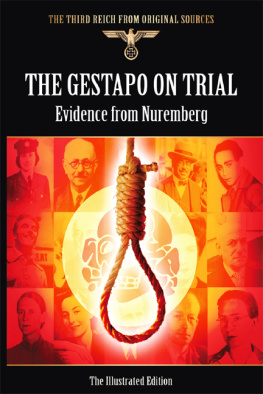Contents
Guide
Pages

Ex Captivitate Salus
Experiences, 194547
Carl Schmitt
Edited by Andreas Kalyvas and Federico Finchelstein
Translated by Matthew Hannah
polity
First published in German as Ex Captivitate Salus. Erfahrungen der Zeit 1945/47, by Greven Verlag, Cologne, 1950. Fourth, extended edition Duncker & Humblot GmbH, Berlin, 2015.
This English edition Polity Press, 2017
Polity Press
65 Bridge Street
Cambridge CB2 1UR, UK
Polity Press
101 Station Landing, Suite 300
Medford, MA 02155, USA
All rights reserved. Except for the quotation of short passages for the purpose of criticism and review, no part of this publication may be reproduced, stored in a retrieval system or transmitted, in any form or by any means, electronic, mechanical, photocopying, recording or otherwise, without the prior permission of the publisher.
ISBN-13: 978-1-5095-1167-9
A catalogue record for this book is available from the British Library.
Names: Schmitt, Carl, 1888-1985, author.
Title: Ex captivitate salus : experiences, 1945-47 / Carl Schmitt.
Other titles: Ex captivitate salus. English.
Description: Cambridge, UK ; Malden, MA, USA : Polity Press, 2017. | Includes bibliographical references and index.
Identifiers: LCCN 2017010109 (print) | LCCN 2017031142 (ebook) | ISBN 9781509511662 (Mobi) | ISBN 9781509511679 (Epub) | ISBN 9781509511631 (hardback) | ISBN 9781509511648 (pbk.)
Subjects: LCSH: Schmitt, Carl, 1888-1985. | Law--Philosophy. | Law teachers--Germany--Biography. | Nazis--Germany--Biography. | Prisoners writings, German.
Classification: LCC K230.S352 (ebook) | LCC K230.S352 E3313 2017 (print) | DDC 340.092--dc23
LC record available at https://lccn.loc.gov/2017010109
The publisher has used its best endeavours to ensure that the URLs for external websites referred to in this book are correct and active at the time of going to press. However, the publisher has no responsibility for the websites and can make no guarantee that a site will remain live or that the content is or will remain appropriate.
Every effort has been made to trace all copyright holders, but if any have been inadvertently overlooked the publisher will be pleased to include any necessary credits in any subsequent reprint or edition.
For further information on Polity, visit our website: politybooks.com
IN MEMORIAM
DR. WILHELM AHLMANN
December 7, 1944
CCUS DEO PROPIVS
Translators Note
All translator interventions appear in square brackets, either in the main text or in footnotes. Most of Schmitts gendered pronouns are left as in the original, in part because he often clearly had himself in mind when writing of anonymous individuals. Humankind, humanity and related terms are, however, substituted for man or men where this does not detract from the resulting English. The translator would like to acknowledge the assistance of George Schwab, the virtuoso copy-editing of Manuela Tecusan, the comments and suggestions of Andreas Kalyvas, Federico Finchelstein and Rory Rowan, and the supportive guidance of Paul Young.
Introduction
Carl Schmitts Prison Writings
Andreas Kalyvas and Federico Finchelstein
I am naked.
Carl Schmitt
If 1945 was a turning point in world history, it was especially so for Carl Schmitts intellectual, academic, public, and personal trajectory. Global reality had changed in unexpected ways: from a world disputed by three ideologiesfascism, communism, and liberalismto a post-European Cold War between the last two, which had allied and defeated the first. Undoubtedly Schmitt was considered one of the most prominent intellectuals in the defeated camp. An admirer of Mussolinis fascist dictatorship, an ambitious member of the Nazi Partywhich he joined on the same day as Martin Heidegger, just a few months after Adolf Hitler came to power in January 1933and a vocal anti-Semite thereafter, Schmitt had seriously contemplated the prospect of becoming a leading voice in national socialist theory.
To be sure, Schmitts work cannot be reduced to his Nazi period. Ultimately, as it became evident in 1936, it was not as influential with the Nazis as he had wanted it to be. But at the same time it cannot be disconnected from Nazism. Before 1933 he authored seminal works on political theology, dictatorship and the state of emergency, political myth, sovereignty, constitutionalism, and, most importantly, enmity as the defining element of the political. After 1933 he sought to recalibrate his work in the direction of international law and world politics, so as to fit the ideological imperatives of the Nazis and avoid party suspicions. However, what defined Schmitt all along and informed his theoretical explorations was his fierce opposition to liberalism and communism. In the new bipolar world that emerged after the fall of Berlin, his long-standing enemies had won and were in a unique position to determine the new political landscape. As fascism was defeated and his enemies victorious, Schmitt had to rethink himself, his work, and his own political standing and, as his biographer Reinhard Mehring put it, to attempt to establish ones identity in the battle for recognition.
* * *
This battle was conducted from prison. Schmitt was arrested twice in 1945 and stripped of his prestigious professorship in Berlin, his library was confiscated, and he spent more than one year in two civilian detention camps, being incarcerated and interrogated again by the Allies, in the spring of 1947, at Nuremberg. At the dawn of a new era that seemingly had no
In prison Schmitt, who was designated by the allies in 1947 as a potential defendant in war crimes, dedicated most of his time to vindicate his past, his work, and himself against charges that in one way or another made him complicit in and responsible for the crimes of Nazism.
To be sure, there are a few other postwar texts by him that could be considered personal in some way. For instance, in his dialogues on power and space in the 1950s, Schmitt will stage himself as an interlocutor among some fictional characters.much broader audience of bystanders who could rehabilitate Schmitts reputation and legacy.
While Schmitt was defeateddefeated as a German, as a jurist, as a European, and as a fascistas a scholar he stated that he was in no sense destroyed. He felt he only needed to mount a satisfactory defense and provide an explanation for the role he played in the Third Reich. And he did so in this book. He took this task upon himself and offered his own political explanation in terms of a general theory of obedience that addresses the borderline case of resistance to tyranny by recasting the distinction between norm and exception from two new angles. In the prison writings Schmitt focused again on the exception, a core concept that defined his Weimar work, but this time he began from below, in the concrete context of civil war. Thus, surprisingly, he revisited the state of exception not from the theological heights of a sovereign power that decides to suspend normal order, as he had depicted it in his interwar years, but from the borderline position of a victim of civil war. Strikingly, he now construed his notion of power from the assumed position of the subordinate, the disenfranchised, the outlawed, the excluded, and the rightless.
These figures of exclusion represent extreme situations, Schmitt claimed. They are the new forms of enmity produced in this new age by the criminalization and dehumanization of the enemy. The post-Eurocentric enemy appears in lawless and violent spacesspaces that confront the citizen with the unpredictable terror unleashed by civil war. In these anomalous and abnormal moments, he explained, the loyal citizen is caught in a situation that is both treacherous and hostile. Confronting a fratricidal battle, he faces the ultimate political question: he must determine the boundaries of his This line of argument became a belated justification of his membership of the Nazi Party and of his activities for and within Hitlers regime. As he explains in this book, accommodation with Nazism was therefore an existential necessity, a lesser evil, and a prudential act of survival under totalitarian domination. He said that victims of such extreme situations, such as himself, resembled closely Herman Melvilles fictional character of Benito Cereno and his tragic adventures. They also evoked the enigmatic figure of a Christian Epimetheus and his Pandoras box.








